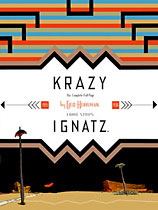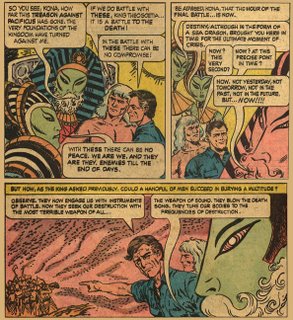 From Bill Blackbeard's introduction to Krazy & Ignatz 1935-1936: "A Wild Warmth of Chromatic Gravy":
From Bill Blackbeard's introduction to Krazy & Ignatz 1935-1936: "A Wild Warmth of Chromatic Gravy":"There are just over four hundred and fifty of them, and each one a masterpiece of graphic comedy. The marvelous product of the last nine years of Garge's richly fruitful life, these weekly color Krazy Kat pages, stunning as they are, almost failed to physically survive the editorial and institutional rigors of their time. We are, in fact, damned lucky to have them on hand at all as source material for this series. There were, you see, just two newspapers -- six day a week sports and crime news afternoon newspapers, throwaway rubbish -- that printed virtually all of the color Kat pages from start to finish. Neither the New York Journal nor the Chicago American, sensational Hearst papers, had anyreferential status at all, and most libraries in their sales areas shunned them -- two papers that virtually no one of any artistic or literary taste and judgment ever saw fro mthe the strip's 1935 start to its 1944 conclusion. Two tombs for the foremost comic strip of all time.
Luckily there was a single dedicated comic strip buff, August Derleth of Sauk City Wisconsin, founder of Arkham House in 1939, who clipped and saved every color Kat page, donating his run to the Wisconsin State Historical Society..."
This floored me! Has someone put up a statue of August Derleth!? What a hero! (See more here.)
Reading this I immediately got up from the couch and called the STL Public Library and ordered that book by Nicholson Baker, which I've always meant to read: Double Fold: Libraries and the Assault on Paper.

I'm near the end of Double Fold now. Read it if you're like me and you're a bibliophile, library lover, or if it gives you bitter yet invigorating pleasure to read histories of human folly, hubris, and tragedy. I wish there was a Library of Congress Subject Heading for these sorts of books. Marvel at how libraries threw out tons of old newspapers and books after microfilming them, and now threaten to do the same in an age of scanning and Internet. Don't you hate microfilm? I also got out Baker's Book of Matches which I finished in bed in 3 nights, and I enjoyed that very much as well. I think Glenn would like it a lot.
Anyways, in the Preface, Baker writes:
"...a man named Blackbeard told a reporter that he had a story for me...Blackbeard had a formal, slightly breathless way of talking; he was obviously intelligent, perhaps a little Ancient Marinerian in the way that lifelongcollectors can be...Some of what Blackbeard told me I couldn't quite comprehend: that the Library of Congress, [esp. arch-villain Verner Clapp, pictured left -kh.] the purported library of last resort, had replaced most of its enormous collection of late-nineteenth and twentieth-century newspapers with microfilm, and that research libraries where relying on what he called "fraudulent" scientific studies when they justified the discarding of books and newspapers on the basis of diagnosed states of acidity and embrittlement.
...In 1967, filled with an ambition to write a history of the American comic strip, he'd discovered that libraries were getting rid of their newspaper collections...Unfortunately he was a private citizen--the library's charter permitted the transfer of material only to a non-profit organization. "I became a non-profit organization so fast you couldn't believe it," Blackbeard told me...He went around the country picking up newspaper volumes..."

So Blackbeard in addition to saving all those newspapers was largely the catalyst for Baker writing Double Fold. Though unfortunately library collections are still not safe from library futurists, Baker and other activists are working to preserve primary source materials--books and newspapers. Double Fold makes a very powerful case and is probably responsible for a lot of eye-opening and hesitation on the part of librarians blinded by technology.
It struck me, thinking about all this, of how much comics have meant for newspapers, back in the day when they helped sell them, and (via Blackbeard) they've helped save them, and how sad that this relationship has been left to wither as much as it has.
UPDATE: There's lots more about Double Fold all over the web, with librarians, archivists, and preservationists responding, for instance here. Like every complex problem that gets people passionate, there's a lot of missing the point going on, but it's always worth getting a wide view of things. Related to this, one of the weird sidelights in the book, a chapter on how mummies were used by the ton as fuel for trains and their wrappings used in linen paper turns out to be untrue. So reader beware.




